2012届叶中高三英语复习:连词及连接词练习(答案详解)
文档属性
| 名称 | 2012届叶中高三英语复习:连词及连接词练习(答案详解) | 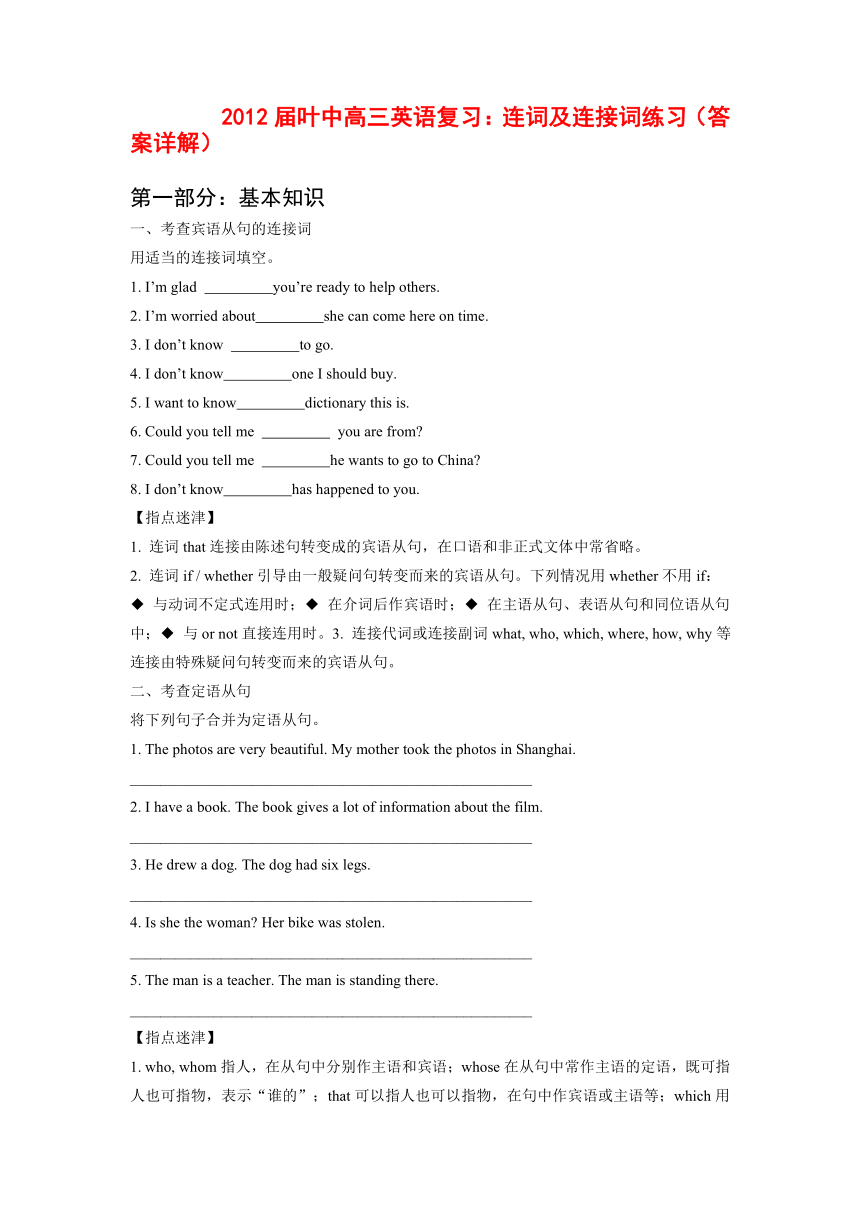 | |
| 格式 | zip | ||
| 文件大小 | 21.1KB | ||
| 资源类型 | 教案 | ||
| 版本资源 | 人教版(新课程标准) | ||
| 科目 | 英语 | ||
| 更新时间 | 2012-01-21 17:45:13 | ||
图片预览

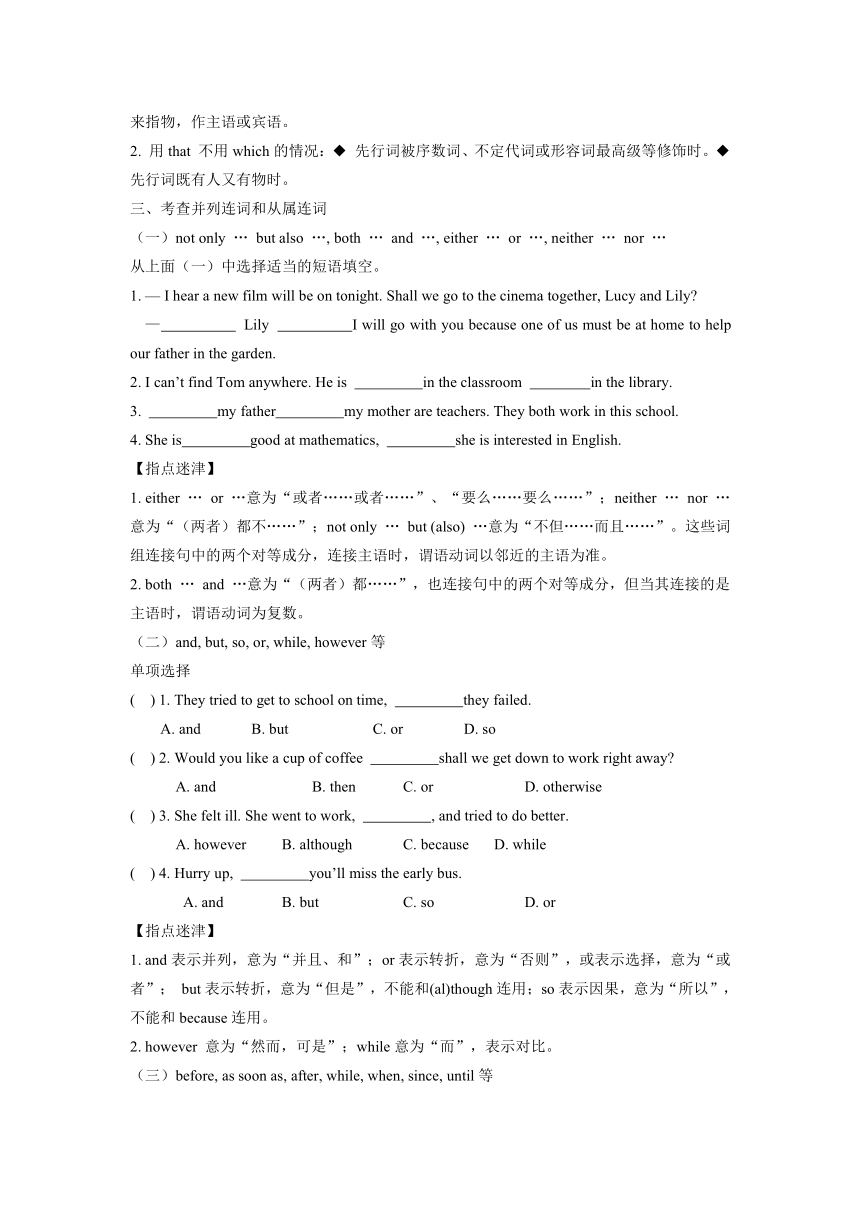
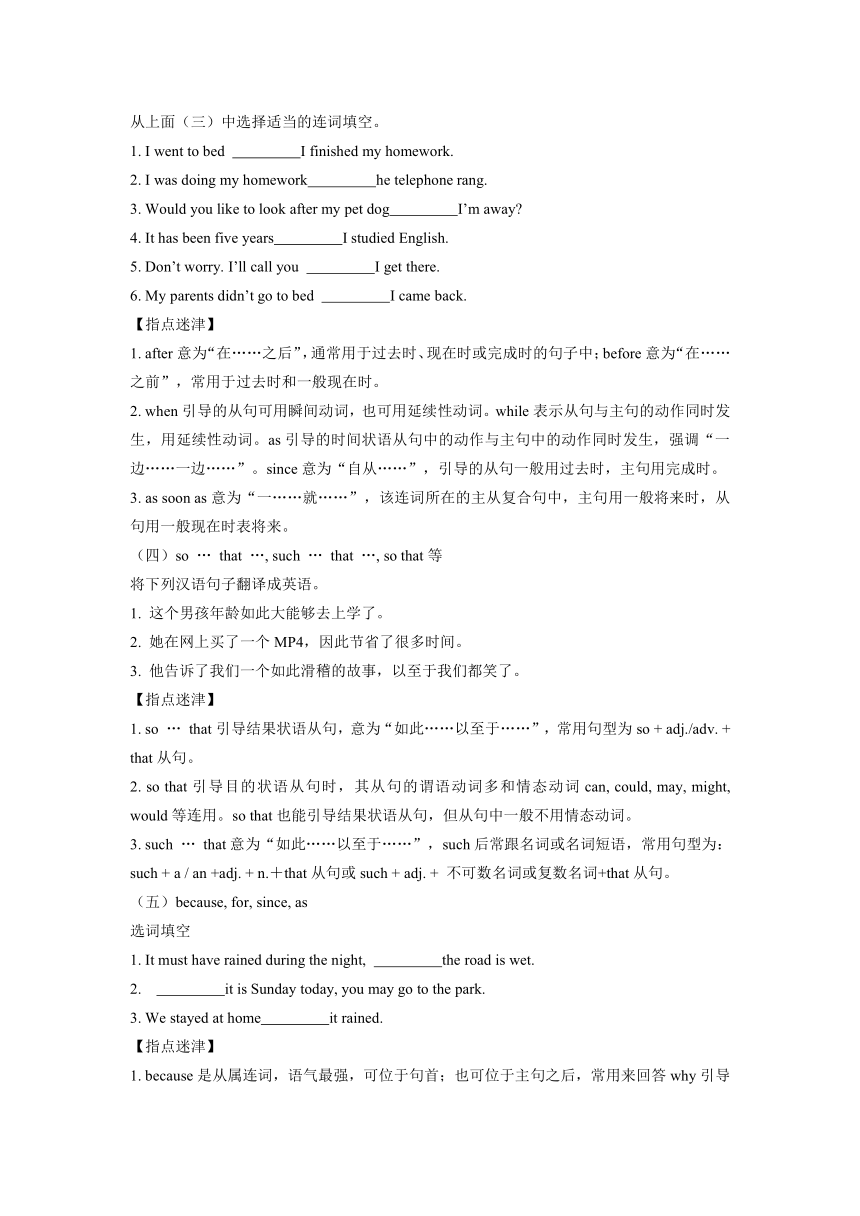
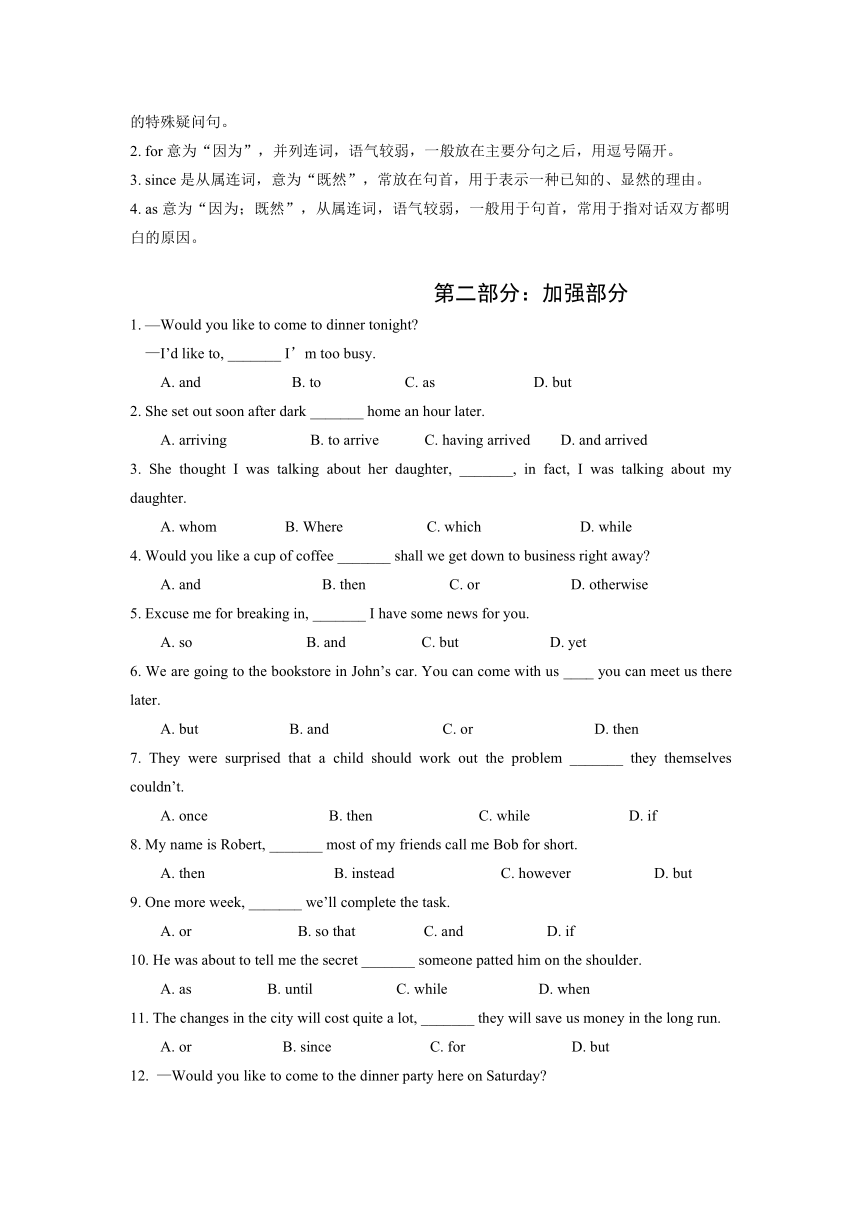
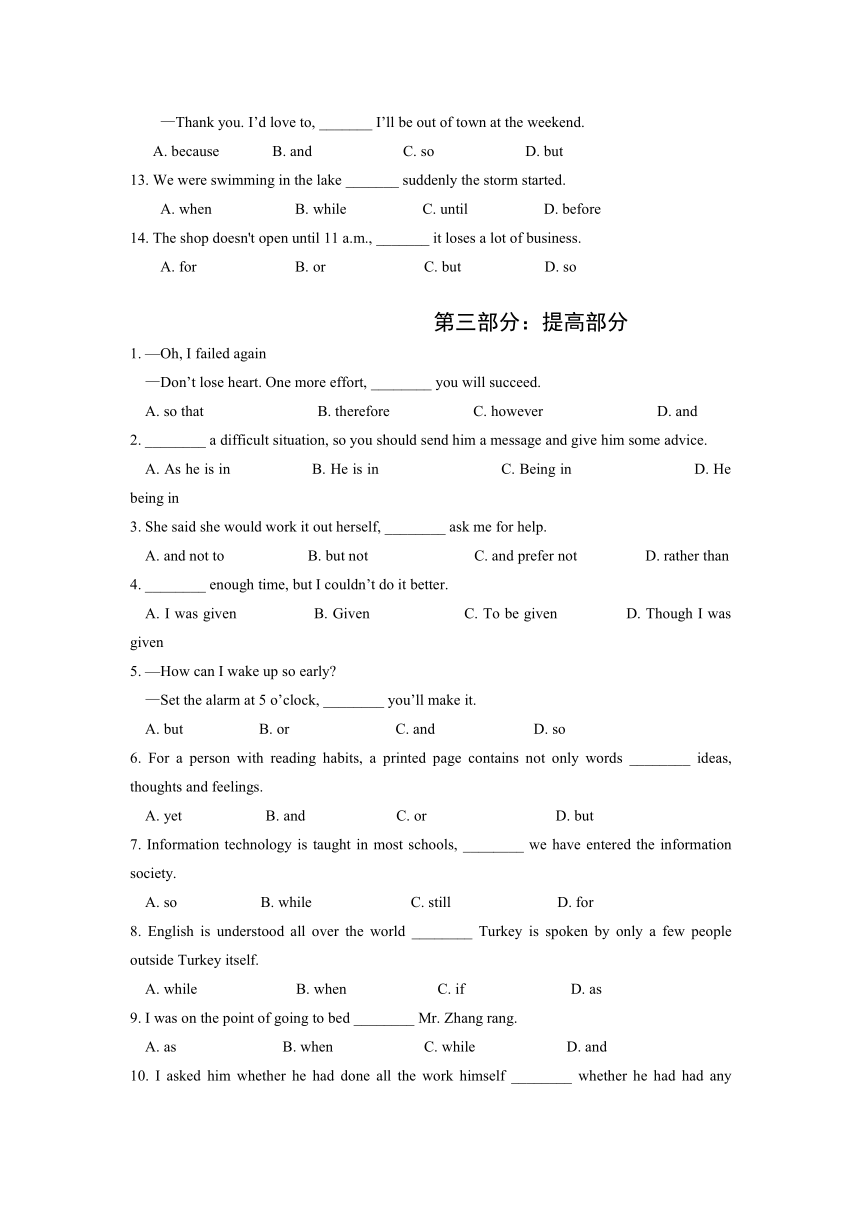
文档简介
2012届叶中高三英语复习:连词及连接词练习(答案详解)
第一部分:基本知识
一、考查宾语从句的连接词
用适当的连接词填空。
1. I’m glad you’re ready to help others.
2. I’m worried about she can come here on time.
3. I don’t know to go.
4. I don’t know one I should buy.
5. I want to know dictionary this is.
6. Could you tell me you are from
7. Could you tell me he wants to go to China
8. I don’t know has happened to you.
【指点迷津】
1. 连词that连接由陈述句转变成的宾语从句,在口语和非正式文体中常省略。
2. 连词if / whether引导由一般疑问句转变而来的宾语从句。下列情况用whether不用if:
◆ 与动词不定式连用时;◆ 在介词后作宾语时;◆ 在主语从句、表语从句和同位语从句中;◆ 与or not直接连用时。3. 连接代词或连接副词what, who, which, where, how, why等连接由特殊疑问句转变而来的宾语从句。
二、考查定语从句
将下列句子合并为定语从句。
1. The photos are very beautiful. My mother took the photos in Shanghai.
_____________________________________________________
2. I have a book. The book gives a lot of information about the film.
_____________________________________________________
3. He drew a dog. The dog had six legs.
_____________________________________________________
4. Is she the woman Her bike was stolen.
_____________________________________________________
5. The man is a teacher. The man is standing there.
_____________________________________________________
【指点迷津】
1. who, whom指人,在从句中分别作主语和宾语;whose在从句中常作主语的定语,既可指人也可指物,表示“谁的”;that可以指人也可以指物,在句中作宾语或主语等;which用来指物,作主语或宾语。
2. 用that 不用which的情况:◆ 先行词被序数词、不定代词或形容词最高级等修饰时。◆ 先行词既有人又有物时。
三、考查并列连词和从属连词
(一)not only … but also …, both … and …, either … or …, neither … nor …
从上面(一)中选择适当的短语填空。
1. — I hear a new film will be on tonight. Shall we go to the cinema together, Lucy and Lily
— Lily I will go with you because one of us must be at home to help our father in the garden.
2. I can’t find Tom anywhere. He is in the classroom in the library.
3. my father my mother are teachers. They both work in this school.
4. She is good at mathematics, she is interested in English.
【指点迷津】
1. either … or …意为“或者……或者……”、“要么……要么……”;neither … nor …意为“(两者)都不……”;not only … but (also) …意为“不但……而且……”。这些词组连接句中的两个对等成分,连接主语时,谓语动词以邻近的主语为准。
2. both … and …意为“(两者)都……”,也连接句中的两个对等成分,但当其连接的是主语时,谓语动词为复数。
(二)and, but, so, or, while, however等
单项选择
( ) 1. They tried to get to school on time, they failed.
A. and B. but C. or D. so
( ) 2. Would you like a cup of coffee shall we get down to work right away
A. and B. then C. or D. otherwise
( ) 3. She felt ill. She went to work, , and tried to do better.
A. however B. although C. because D. while
( ) 4. Hurry up, you’ll miss the early bus.
A. and B. but C. so D. or
【指点迷津】
1. and表示并列,意为“并且、和”;or表示转折,意为“否则”,或表示选择,意为“或者”; but表示转折,意为“但是”,不能和(al)though连用;so表示因果,意为“所以”,不能和because连用。
2. however 意为“然而,可是”;while意为“而”,表示对比。
(三)before, as soon as, after, while, when, since, until等
从上面(三)中选择适当的连词填空。
1. I went to bed I finished my homework.
2. I was doing my homework he telephone rang.
3. Would you like to look after my pet dog I’m away
4. It has been five years I studied English.
5. Don’t worry. I’ll call you I get there.
6. My parents didn’t go to bed I came back.
【指点迷津】
1. after意为“在……之后”,通常用于过去时、现在时或完成时的句子中;before意为“在……之前”,常用于过去时和一般现在时。
2. when引导的从句可用瞬间动词,也可用延续性动词。while表示从句与主句的动作同时发生,用延续性动词。as引导的时间状语从句中的动作与主句中的动作同时发生,强调“一边……一边……”。since意为“自从……”,引导的从句一般用过去时,主句用完成时。
3. as soon as意为“一……就……”,该连词所在的主从复合句中,主句用一般将来时,从句用一般现在时表将来。
(四)so … that …, such … that …, so that等
将下列汉语句子翻译成英语。
1. 这个男孩年龄如此大能够去上学了。
2. 她在网上买了一个MP4,因此节省了很多时间。
3. 他告诉了我们一个如此滑稽的故事,以至于我们都笑了。
【指点迷津】
1. so … that引导结果状语从句,意为“如此……以至于……”,常用句型为so + adj./adv. + that从句。
2. so that引导目的状语从句时,其从句的谓语动词多和情态动词can, could, may, might, would等连用。so that也能引导结果状语从句,但从句中一般不用情态动词。
3. such … that意为“如此……以至于……”,such后常跟名词或名词短语,常用句型为:such + a / an +adj. + n.+that从句或such + adj. + 不可数名词或复数名词+that从句。
(五)because, for, since, as
选词填空
1. It must have rained during the night, the road is wet.
2. it is Sunday today, you may go to the park.
3. We stayed at home it rained.
【指点迷津】
1. because是从属连词,语气最强,可位于句首;也可位于主句之后,常用来回答why引导的特殊疑问句。
2. for意为“因为”,并列连词,语气较弱,一般放在主要分句之后,用逗号隔开。
3. since是从属连词,意为“既然”,常放在句首,用于表示一种已知的、显然的理由。
4. as意为“因为;既然”,从属连词,语气较弱,一般用于句首,常用于指对话双方都明白的原因。
第二部分:加强部分
1. —Would you like to come to dinner tonight
—I’d like to, _______ I’m too busy.
A. and B. to C. as D. but
2. She set out soon after dark _______ home an hour later.
A. arriving B. to arrive C. having arrived D. and arrived
3. She thought I was talking about her daughter, _______, in fact, I was talking about my daughter.
A. whom B. Where C. which D. while
4. Would you like a cup of coffee _______ shall we get down to business right away
A. and B. then C. or D. otherwise
5. Excuse me for breaking in, _______ I have some news for you.
A. so B. and C. but D. yet
6. We are going to the bookstore in John’s car. You can come with us ____ you can meet us there later.
A. but B. and C. or D. then
7. They were surprised that a child should work out the problem _______ they themselves couldn’t.
A. once B. then C. while D. if
8. My name is Robert, _______ most of my friends call me Bob for short.
A. then B. instead C. however D. but
9. One more week, _______ we’ll complete the task.
A. or B. so that C. and D. if
10. He was about to tell me the secret _______ someone patted him on the shoulder.
A. as B. until C. while D. when
11. The changes in the city will cost quite a lot, _______ they will save us money in the long run.
A. or B. since C. for D. but
12. —Would you like to come to the dinner party here on Saturday
—Thank you. I’d love to, _______ I’ll be out of town at the weekend.
A. because B. and C. so D. but
13. We were swimming in the lake _______ suddenly the storm started.
A. when B. while C. until D. before
14. The shop doesn't open until 11 a.m., _______ it loses a lot of business.
A. for B. or C. but D. so
第三部分:提高部分
1. —Oh, I failed again
—Don’t lose heart. One more effort, ________ you will succeed.
A. so that B. therefore C. however D. and
2. ________ a difficult situation, so you should send him a message and give him some advice.
A. As he is in B. He is in C. Being in D. He being in
3. She said she would work it out herself, ________ ask me for help.
A. and not to B. but not C. and prefer not D. rather than
4. ________ enough time, but I couldn’t do it better.
A. I was given B. Given C. To be given D. Though I was given
5. —How can I wake up so early
—Set the alarm at 5 o’clock, ________ you’ll make it.
A. but B. or C. and D. so
6. For a person with reading habits, a printed page contains not only words ________ ideas, thoughts and feelings.
A. yet B. and C. or D. but
7. Information technology is taught in most schools, ________ we have entered the information society.
A. so B. while C. still D. for
8. English is understood all over the world ________ Turkey is spoken by only a few people outside Turkey itself.
A. while B. when C. if D. as
9. I was on the point of going to bed ________ Mr. Zhang rang.
A. as B. when C. while D. and
10. I asked him whether he had done all the work himself ________ whether he had had any assistance.
A. and B. but C. nor D. or
11. In some countries, ________ are called “public schools” are not owned by the public.
A. which B. as C. what D. that
12. ________ happens in the world makes us happy and sad by turns.
A. That B. What C. Which D. Whether
13. I read about this story in some book or other, does it matter ________ it was
A. where B. what C. how D. which
14. One of the men present held the view ________ the book said was right.
A. what that B. what C. that D. that what
15. ________ I had walked for six hours, I was tired out.
A. After B. Before C. When D. As
16. Tom make up his mind to get a seat for the football match ________ it means standing in a queue all night.
A. as if B. as though C. even if D. whatever
17. The roof fell ________ he had time to dash into the house to save his baby.
A. as B. after C. until D. before
18. Doing your homework is a sure way to improve your test scores, and this is especially true ________ it comes to classroom tests.
A. as B. since C. when D. after
19. I have been keeping that photo ________ I can see it every day, as it always reminds me of my college days.
A. which B. where C. whether D. when
20. You may borrow this book ________ you promise to give it back.
A. in case B. so long as C. as if D. even if
21. ________ the man grew older, he lost interest in everything except gardening.
A. With B. Since C. While D. As
22. ________ you understand this rule, you’ll have no further difficulty.
A. Once B. Unless C. As D. Until
23. I had no sooner got back to the kitchen ________ the door-bell rang loud enough to wake the dead.
A. when B. than C. as D. while
24. I criticized him, you know, not ________ I hate him but ________ I love him.
A. because; because B. because; for C. for; because D. for; for
25. ________ he studies hard, he will never pass the examination.
A. If B. Unless C. Even if D. Even though
26. She worked hard ________ everything would be ready by the time he came back.
A. since B. so that C. as if D. unless
27. He waited ________ the volcano became quiet and he was able to return two days later.
A. when B. before C. as D. until
28. — May I go and play football with Dick this afternoon, Dad
— No, you can’t go out ________ your work is being done.
A. before B. until C. as D. after
29. A warning news report from Qatar announces that a group of Islam will continue to kill Americans wherever they are ________ they leave the Arab world forever.
A. even though B. in case C. whenever D. until
30. I was so familiar with her that I recognized her voice ________ I picked up the phone.
A. the moment B. after C. before D. while
2012届叶中高三英语复习:连词及连接词练习答案
第一部分:基本知识
一、1. that 2. whether 3. where 4. which 5. whose 6. where 7. if / whether / why 8. what
二、1. The photos that my mother took in Shanghai are very beautiful.
2. I have a book that gives a lot of information about the film.
3. He drew a dog which had six legs.
4. Is she the woman whose bike was stolen
5. The man who is standing there is a teacher.
三、(一)1. Either; or 2. neither; nor 3. Both; and 4. not only; but also
(二) 1-4 BCAD
(三)1. after 2. when 3. while 4. since 5. as soon as / when 6. until
(四)1. The man is so old that he cannot walk fast.
2. She bought an MP4 player online so that she saved a lot of time.
3. He told us such a funny story that we all laughed.
(五)1. for 2. Since / As 3. because
第二部分:加强部分
1. D。“想去”与“太忙”是转折关系,用 but。
2. D。出发和到达是两个先后发生的动作,用 and 连接作并列谓语。用A表示同时发生,不对;选项 C 指“到达”在“出发”之前发生,不可能;B 表示目的,不合情理。
3. D。while 用以表示对比或相反的情况,意为“而、却”。
4. C。or 连接两个一般疑问句,表示选择,意为“还是”。
5. C。but 用在 Excuse me 或 I’m sorry 等后面,只起缓和语气的作用,通常不必译出。
6. C。or 表选择,意为“或者”。
7. C。while(而、却)表示转折。句意为:令他们吃惊的是,一个孩子居然能解决这个难题,而他们自己却不能。
8. D。but 表示转折。句意为:我的名字叫罗勃特,但我的大多数朋友都简称我为鲍勃。
9. C。此题依然是考查“祈使句+and/then/or+陈述句”这一句型,只是祈使句部分是用一个名词短语来表示的。
10. D。…was / were about to do sth…when… 是个常用句型,表示某人正要做某事,就在这时(突然)发生另外一件事。句意为:他正要告诉我这个秘密,这时,有人拍了拍他的肩膀。
11. D。cost quite a lot 和 save us money 在意义上有转折关系,用 but。句意是“改变这个城市的面貌要花很多钱,但从长远的观点看这些变化可以为我们省钱。”in the long run 是“从长远看、终究”之意。
12. D。“想去”与“出城去而不能参加宴会”是转折关系,用 but。
13. A。when表示在某动作发生的过程中,突然发生另外一动作,通常译为“这时(突然)”。
14. D。前后两句为因果关系。
第三部分:提高部分
1. D. 考查“祈使句/名词+and+陈述句”句型。句意为:“再努力点,你就会成功的”。
2. B. so (因此)是并列连词,引出一个表示结果的分句,前面应是一个表示原因的分句,而无需再用连词,排除A;C和D又不是句子,也错了。
3. D. 因为rather than是对称连词,意为“而不” (from www.hxen.com)。
4. A. 因为but是并列连词,后面是个句子,前面也一定是个句子,而不是一个分词短语或不定式短语,更不能再用连词though,所以排除B、C和D。
5. C. 考查“祈使句+and+陈述句”句型,意为“如果…就…”。虽然or也可用于此句型,但or是“否则、要不然”之意,如:Work hard, or you’ll fail. (努力学习,否则就会不及格。)
6. D. 因为not only…but (also)…是固定搭配(from www.hxen.com)。
7. D. 因为句中的并列连词for表示原因,是对前面分句所述内容的解释或补充说明。
8. A. 因为句中的并列连词while表示“对比或相反”。
9. B. 因为句中的并列连词when = just at that time, 意为“这时(突然)”。
10. D. 因为只有or才能表示选择,意为“(是…) 还是”。
11. C。本题考查what引导主语从句,并在主语从句中作主语。句意为“在许多国家,所谓的“公立学校”并非公众拥有。
12. B。本题考查引导主语从句的连接词。that引导主语从句只起连接作用,在从句中不作任何成分,无意义,但不能省略。what除引导主语从句外, 还在从句中作成分。which指一定范围内的“哪一个”;whether意为“是否”。根据句意“世上的事喜忧交替”可知答案为B(from www.hxen.com)。
13. D。该题考查宾语从句。可以看作是does it matter which book it was的省略。一定注意此题受母语干扰,很容易错选答案为A。只要抓住题干前一句I read about this story in some book or other的提示,就可知道是指一定范围内的“哪一个”,故答案为D。
14. D。that引导同位语从句;what the book said是同位语从句中的主语。
15. A。本题考查以after引导的时间状语从句,意为“在…之后”。句意为“步行了六小时后,我累坏了”。
16. C。even if=even though,引导的让步状语从句,意为“即使, 尽管”,符合题意。
17. D。本题考查before引导的时间状语从句,意为“在……之前”。句意为“他来不及冲进去救他的孩子,屋顶就塌了”。
18. C。When it comes to. . . 是一固定句型,意为“当谈到……时,涉及”。句意为“做作业是提高考分的一个可靠方法,这在涉及到课堂测验时尤其正确” (from www.hxen.com)。
19. B。该题考查where引导的地点状语从句,表示“在…地方”。句意为“我一直把照片放在我每天都能看到的地方,因为它总使我回想起大学里的日子”。
20. B。so long as=so long as, 意为“只要”,表示条件。句意为“只要你答应归还,你就可以把这书借走”。
21. D。本题考查as引导的时间状语从句,表示事物的进展,意为“随着”。句意为“那人年纪越来越大,除了园艺外其他都不感兴趣”。
22. A。once引导的让步状语从句,意为“一旦”。句意为“一旦明白了这条规则,就再也没有困难了”。
23. B。no sooner…than意为“刚…就”,相当于as soon as. 句意为“我刚走回厨房,门铃又响了,响得足以把死人吵醒”。类似用法还有hardly / scarcely…when.。
24. A。本题考查because引导的原因状语从句及与for的区别。for不能跟not...but这一结构连用,句意为“我批评他不是因为我恨他而是因为我爱他”。
25. C。unless引导的条件状语从句。句意为“他如果不努力学习, 就永远不能考及格”
26. B。so that引导目的状语从句。句意为“她拼命干一边能在他回来时把一切都准备好”。
27. D。until引导的时间状语从句。句意为“他一直等到火山平息下来,两天后他才得以重回火山上”。
28. C。此题很容易错选B。误认为是not…until句型。实际上只要抓住your work is being done. 这一提示就找到了答题的关键。
29. D。本题考查until引导的时间状语从句,意为“到. . . 为止, 在. . . 以前”。
30. A。名词短语the moment用作连词,相当于as soon as,引导时间状语从句。 意为“一……就”。类似的短语或词还有the minute, the instance, directly, immediately等
第一部分:基本知识
一、考查宾语从句的连接词
用适当的连接词填空。
1. I’m glad you’re ready to help others.
2. I’m worried about she can come here on time.
3. I don’t know to go.
4. I don’t know one I should buy.
5. I want to know dictionary this is.
6. Could you tell me you are from
7. Could you tell me he wants to go to China
8. I don’t know has happened to you.
【指点迷津】
1. 连词that连接由陈述句转变成的宾语从句,在口语和非正式文体中常省略。
2. 连词if / whether引导由一般疑问句转变而来的宾语从句。下列情况用whether不用if:
◆ 与动词不定式连用时;◆ 在介词后作宾语时;◆ 在主语从句、表语从句和同位语从句中;◆ 与or not直接连用时。3. 连接代词或连接副词what, who, which, where, how, why等连接由特殊疑问句转变而来的宾语从句。
二、考查定语从句
将下列句子合并为定语从句。
1. The photos are very beautiful. My mother took the photos in Shanghai.
_____________________________________________________
2. I have a book. The book gives a lot of information about the film.
_____________________________________________________
3. He drew a dog. The dog had six legs.
_____________________________________________________
4. Is she the woman Her bike was stolen.
_____________________________________________________
5. The man is a teacher. The man is standing there.
_____________________________________________________
【指点迷津】
1. who, whom指人,在从句中分别作主语和宾语;whose在从句中常作主语的定语,既可指人也可指物,表示“谁的”;that可以指人也可以指物,在句中作宾语或主语等;which用来指物,作主语或宾语。
2. 用that 不用which的情况:◆ 先行词被序数词、不定代词或形容词最高级等修饰时。◆ 先行词既有人又有物时。
三、考查并列连词和从属连词
(一)not only … but also …, both … and …, either … or …, neither … nor …
从上面(一)中选择适当的短语填空。
1. — I hear a new film will be on tonight. Shall we go to the cinema together, Lucy and Lily
— Lily I will go with you because one of us must be at home to help our father in the garden.
2. I can’t find Tom anywhere. He is in the classroom in the library.
3. my father my mother are teachers. They both work in this school.
4. She is good at mathematics, she is interested in English.
【指点迷津】
1. either … or …意为“或者……或者……”、“要么……要么……”;neither … nor …意为“(两者)都不……”;not only … but (also) …意为“不但……而且……”。这些词组连接句中的两个对等成分,连接主语时,谓语动词以邻近的主语为准。
2. both … and …意为“(两者)都……”,也连接句中的两个对等成分,但当其连接的是主语时,谓语动词为复数。
(二)and, but, so, or, while, however等
单项选择
( ) 1. They tried to get to school on time, they failed.
A. and B. but C. or D. so
( ) 2. Would you like a cup of coffee shall we get down to work right away
A. and B. then C. or D. otherwise
( ) 3. She felt ill. She went to work, , and tried to do better.
A. however B. although C. because D. while
( ) 4. Hurry up, you’ll miss the early bus.
A. and B. but C. so D. or
【指点迷津】
1. and表示并列,意为“并且、和”;or表示转折,意为“否则”,或表示选择,意为“或者”; but表示转折,意为“但是”,不能和(al)though连用;so表示因果,意为“所以”,不能和because连用。
2. however 意为“然而,可是”;while意为“而”,表示对比。
(三)before, as soon as, after, while, when, since, until等
从上面(三)中选择适当的连词填空。
1. I went to bed I finished my homework.
2. I was doing my homework he telephone rang.
3. Would you like to look after my pet dog I’m away
4. It has been five years I studied English.
5. Don’t worry. I’ll call you I get there.
6. My parents didn’t go to bed I came back.
【指点迷津】
1. after意为“在……之后”,通常用于过去时、现在时或完成时的句子中;before意为“在……之前”,常用于过去时和一般现在时。
2. when引导的从句可用瞬间动词,也可用延续性动词。while表示从句与主句的动作同时发生,用延续性动词。as引导的时间状语从句中的动作与主句中的动作同时发生,强调“一边……一边……”。since意为“自从……”,引导的从句一般用过去时,主句用完成时。
3. as soon as意为“一……就……”,该连词所在的主从复合句中,主句用一般将来时,从句用一般现在时表将来。
(四)so … that …, such … that …, so that等
将下列汉语句子翻译成英语。
1. 这个男孩年龄如此大能够去上学了。
2. 她在网上买了一个MP4,因此节省了很多时间。
3. 他告诉了我们一个如此滑稽的故事,以至于我们都笑了。
【指点迷津】
1. so … that引导结果状语从句,意为“如此……以至于……”,常用句型为so + adj./adv. + that从句。
2. so that引导目的状语从句时,其从句的谓语动词多和情态动词can, could, may, might, would等连用。so that也能引导结果状语从句,但从句中一般不用情态动词。
3. such … that意为“如此……以至于……”,such后常跟名词或名词短语,常用句型为:such + a / an +adj. + n.+that从句或such + adj. + 不可数名词或复数名词+that从句。
(五)because, for, since, as
选词填空
1. It must have rained during the night, the road is wet.
2. it is Sunday today, you may go to the park.
3. We stayed at home it rained.
【指点迷津】
1. because是从属连词,语气最强,可位于句首;也可位于主句之后,常用来回答why引导的特殊疑问句。
2. for意为“因为”,并列连词,语气较弱,一般放在主要分句之后,用逗号隔开。
3. since是从属连词,意为“既然”,常放在句首,用于表示一种已知的、显然的理由。
4. as意为“因为;既然”,从属连词,语气较弱,一般用于句首,常用于指对话双方都明白的原因。
第二部分:加强部分
1. —Would you like to come to dinner tonight
—I’d like to, _______ I’m too busy.
A. and B. to C. as D. but
2. She set out soon after dark _______ home an hour later.
A. arriving B. to arrive C. having arrived D. and arrived
3. She thought I was talking about her daughter, _______, in fact, I was talking about my daughter.
A. whom B. Where C. which D. while
4. Would you like a cup of coffee _______ shall we get down to business right away
A. and B. then C. or D. otherwise
5. Excuse me for breaking in, _______ I have some news for you.
A. so B. and C. but D. yet
6. We are going to the bookstore in John’s car. You can come with us ____ you can meet us there later.
A. but B. and C. or D. then
7. They were surprised that a child should work out the problem _______ they themselves couldn’t.
A. once B. then C. while D. if
8. My name is Robert, _______ most of my friends call me Bob for short.
A. then B. instead C. however D. but
9. One more week, _______ we’ll complete the task.
A. or B. so that C. and D. if
10. He was about to tell me the secret _______ someone patted him on the shoulder.
A. as B. until C. while D. when
11. The changes in the city will cost quite a lot, _______ they will save us money in the long run.
A. or B. since C. for D. but
12. —Would you like to come to the dinner party here on Saturday
—Thank you. I’d love to, _______ I’ll be out of town at the weekend.
A. because B. and C. so D. but
13. We were swimming in the lake _______ suddenly the storm started.
A. when B. while C. until D. before
14. The shop doesn't open until 11 a.m., _______ it loses a lot of business.
A. for B. or C. but D. so
第三部分:提高部分
1. —Oh, I failed again
—Don’t lose heart. One more effort, ________ you will succeed.
A. so that B. therefore C. however D. and
2. ________ a difficult situation, so you should send him a message and give him some advice.
A. As he is in B. He is in C. Being in D. He being in
3. She said she would work it out herself, ________ ask me for help.
A. and not to B. but not C. and prefer not D. rather than
4. ________ enough time, but I couldn’t do it better.
A. I was given B. Given C. To be given D. Though I was given
5. —How can I wake up so early
—Set the alarm at 5 o’clock, ________ you’ll make it.
A. but B. or C. and D. so
6. For a person with reading habits, a printed page contains not only words ________ ideas, thoughts and feelings.
A. yet B. and C. or D. but
7. Information technology is taught in most schools, ________ we have entered the information society.
A. so B. while C. still D. for
8. English is understood all over the world ________ Turkey is spoken by only a few people outside Turkey itself.
A. while B. when C. if D. as
9. I was on the point of going to bed ________ Mr. Zhang rang.
A. as B. when C. while D. and
10. I asked him whether he had done all the work himself ________ whether he had had any assistance.
A. and B. but C. nor D. or
11. In some countries, ________ are called “public schools” are not owned by the public.
A. which B. as C. what D. that
12. ________ happens in the world makes us happy and sad by turns.
A. That B. What C. Which D. Whether
13. I read about this story in some book or other, does it matter ________ it was
A. where B. what C. how D. which
14. One of the men present held the view ________ the book said was right.
A. what that B. what C. that D. that what
15. ________ I had walked for six hours, I was tired out.
A. After B. Before C. When D. As
16. Tom make up his mind to get a seat for the football match ________ it means standing in a queue all night.
A. as if B. as though C. even if D. whatever
17. The roof fell ________ he had time to dash into the house to save his baby.
A. as B. after C. until D. before
18. Doing your homework is a sure way to improve your test scores, and this is especially true ________ it comes to classroom tests.
A. as B. since C. when D. after
19. I have been keeping that photo ________ I can see it every day, as it always reminds me of my college days.
A. which B. where C. whether D. when
20. You may borrow this book ________ you promise to give it back.
A. in case B. so long as C. as if D. even if
21. ________ the man grew older, he lost interest in everything except gardening.
A. With B. Since C. While D. As
22. ________ you understand this rule, you’ll have no further difficulty.
A. Once B. Unless C. As D. Until
23. I had no sooner got back to the kitchen ________ the door-bell rang loud enough to wake the dead.
A. when B. than C. as D. while
24. I criticized him, you know, not ________ I hate him but ________ I love him.
A. because; because B. because; for C. for; because D. for; for
25. ________ he studies hard, he will never pass the examination.
A. If B. Unless C. Even if D. Even though
26. She worked hard ________ everything would be ready by the time he came back.
A. since B. so that C. as if D. unless
27. He waited ________ the volcano became quiet and he was able to return two days later.
A. when B. before C. as D. until
28. — May I go and play football with Dick this afternoon, Dad
— No, you can’t go out ________ your work is being done.
A. before B. until C. as D. after
29. A warning news report from Qatar announces that a group of Islam will continue to kill Americans wherever they are ________ they leave the Arab world forever.
A. even though B. in case C. whenever D. until
30. I was so familiar with her that I recognized her voice ________ I picked up the phone.
A. the moment B. after C. before D. while
2012届叶中高三英语复习:连词及连接词练习答案
第一部分:基本知识
一、1. that 2. whether 3. where 4. which 5. whose 6. where 7. if / whether / why 8. what
二、1. The photos that my mother took in Shanghai are very beautiful.
2. I have a book that gives a lot of information about the film.
3. He drew a dog which had six legs.
4. Is she the woman whose bike was stolen
5. The man who is standing there is a teacher.
三、(一)1. Either; or 2. neither; nor 3. Both; and 4. not only; but also
(二) 1-4 BCAD
(三)1. after 2. when 3. while 4. since 5. as soon as / when 6. until
(四)1. The man is so old that he cannot walk fast.
2. She bought an MP4 player online so that she saved a lot of time.
3. He told us such a funny story that we all laughed.
(五)1. for 2. Since / As 3. because
第二部分:加强部分
1. D。“想去”与“太忙”是转折关系,用 but。
2. D。出发和到达是两个先后发生的动作,用 and 连接作并列谓语。用A表示同时发生,不对;选项 C 指“到达”在“出发”之前发生,不可能;B 表示目的,不合情理。
3. D。while 用以表示对比或相反的情况,意为“而、却”。
4. C。or 连接两个一般疑问句,表示选择,意为“还是”。
5. C。but 用在 Excuse me 或 I’m sorry 等后面,只起缓和语气的作用,通常不必译出。
6. C。or 表选择,意为“或者”。
7. C。while(而、却)表示转折。句意为:令他们吃惊的是,一个孩子居然能解决这个难题,而他们自己却不能。
8. D。but 表示转折。句意为:我的名字叫罗勃特,但我的大多数朋友都简称我为鲍勃。
9. C。此题依然是考查“祈使句+and/then/or+陈述句”这一句型,只是祈使句部分是用一个名词短语来表示的。
10. D。…was / were about to do sth…when… 是个常用句型,表示某人正要做某事,就在这时(突然)发生另外一件事。句意为:他正要告诉我这个秘密,这时,有人拍了拍他的肩膀。
11. D。cost quite a lot 和 save us money 在意义上有转折关系,用 but。句意是“改变这个城市的面貌要花很多钱,但从长远的观点看这些变化可以为我们省钱。”in the long run 是“从长远看、终究”之意。
12. D。“想去”与“出城去而不能参加宴会”是转折关系,用 but。
13. A。when表示在某动作发生的过程中,突然发生另外一动作,通常译为“这时(突然)”。
14. D。前后两句为因果关系。
第三部分:提高部分
1. D. 考查“祈使句/名词+and+陈述句”句型。句意为:“再努力点,你就会成功的”。
2. B. so (因此)是并列连词,引出一个表示结果的分句,前面应是一个表示原因的分句,而无需再用连词,排除A;C和D又不是句子,也错了。
3. D. 因为rather than是对称连词,意为“而不” (from www.hxen.com)。
4. A. 因为but是并列连词,后面是个句子,前面也一定是个句子,而不是一个分词短语或不定式短语,更不能再用连词though,所以排除B、C和D。
5. C. 考查“祈使句+and+陈述句”句型,意为“如果…就…”。虽然or也可用于此句型,但or是“否则、要不然”之意,如:Work hard, or you’ll fail. (努力学习,否则就会不及格。)
6. D. 因为not only…but (also)…是固定搭配(from www.hxen.com)。
7. D. 因为句中的并列连词for表示原因,是对前面分句所述内容的解释或补充说明。
8. A. 因为句中的并列连词while表示“对比或相反”。
9. B. 因为句中的并列连词when = just at that time, 意为“这时(突然)”。
10. D. 因为只有or才能表示选择,意为“(是…) 还是”。
11. C。本题考查what引导主语从句,并在主语从句中作主语。句意为“在许多国家,所谓的“公立学校”并非公众拥有。
12. B。本题考查引导主语从句的连接词。that引导主语从句只起连接作用,在从句中不作任何成分,无意义,但不能省略。what除引导主语从句外, 还在从句中作成分。which指一定范围内的“哪一个”;whether意为“是否”。根据句意“世上的事喜忧交替”可知答案为B(from www.hxen.com)。
13. D。该题考查宾语从句。可以看作是does it matter which book it was的省略。一定注意此题受母语干扰,很容易错选答案为A。只要抓住题干前一句I read about this story in some book or other的提示,就可知道是指一定范围内的“哪一个”,故答案为D。
14. D。that引导同位语从句;what the book said是同位语从句中的主语。
15. A。本题考查以after引导的时间状语从句,意为“在…之后”。句意为“步行了六小时后,我累坏了”。
16. C。even if=even though,引导的让步状语从句,意为“即使, 尽管”,符合题意。
17. D。本题考查before引导的时间状语从句,意为“在……之前”。句意为“他来不及冲进去救他的孩子,屋顶就塌了”。
18. C。When it comes to. . . 是一固定句型,意为“当谈到……时,涉及”。句意为“做作业是提高考分的一个可靠方法,这在涉及到课堂测验时尤其正确” (from www.hxen.com)。
19. B。该题考查where引导的地点状语从句,表示“在…地方”。句意为“我一直把照片放在我每天都能看到的地方,因为它总使我回想起大学里的日子”。
20. B。so long as=so long as, 意为“只要”,表示条件。句意为“只要你答应归还,你就可以把这书借走”。
21. D。本题考查as引导的时间状语从句,表示事物的进展,意为“随着”。句意为“那人年纪越来越大,除了园艺外其他都不感兴趣”。
22. A。once引导的让步状语从句,意为“一旦”。句意为“一旦明白了这条规则,就再也没有困难了”。
23. B。no sooner…than意为“刚…就”,相当于as soon as. 句意为“我刚走回厨房,门铃又响了,响得足以把死人吵醒”。类似用法还有hardly / scarcely…when.。
24. A。本题考查because引导的原因状语从句及与for的区别。for不能跟not...but这一结构连用,句意为“我批评他不是因为我恨他而是因为我爱他”。
25. C。unless引导的条件状语从句。句意为“他如果不努力学习, 就永远不能考及格”
26. B。so that引导目的状语从句。句意为“她拼命干一边能在他回来时把一切都准备好”。
27. D。until引导的时间状语从句。句意为“他一直等到火山平息下来,两天后他才得以重回火山上”。
28. C。此题很容易错选B。误认为是not…until句型。实际上只要抓住your work is being done. 这一提示就找到了答题的关键。
29. D。本题考查until引导的时间状语从句,意为“到. . . 为止, 在. . . 以前”。
30. A。名词短语the moment用作连词,相当于as soon as,引导时间状语从句。 意为“一……就”。类似的短语或词还有the minute, the instance, directly, immediately等
